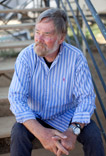 In a sense, you could say Stu Peters was there before it all began.
In a sense, you could say Stu Peters was there before it all began.
Peters, who raced motocross professionally in Europe in the early 1960s, brought back from the old country a deep understanding of this more-condensed, more-radical version of scrambles racing called “motocross,” and poured everything he knew about it into running local races near his Southern California home.
His reputation as a capable and fair promoter of popular events grew quickly, and in 1970, the American Motorcyclist Association approached Peters and his Continental Motosport Club (CMC) to run two rounds of what was then a new concept: a nationally sanctioned championship series recognized by the world’s governing body of motorcycle sport, the Federation Internationale de Motocyclisme (FIM). Peters agreed, and his role in the 1970 Trans-AMA Series was defined.
Peters’ history with motorcycles began in the 1950s. Growing up in the west end of the San Fernando Valley, at that time a vast agricultural area, the 15-year-old Peters convinced his mom to let him get a motorcycle.. Soon, Peters was involved with local off-road riding clubs, helping lay out tracks and run races.
“I was just an enthusiast riding in the Santa Monica Mountains,” Peters remembers. “There were a lot of fire roads all over those hills.”
Peters’ skills grew, and he went to Europe to race the Grand Prix circuit in 1961. Riding a BSA Goldstar, Peters was one of the first American riders to compete on the world stage. Although he never won a championship, Peters’ European racing career lasted for five years. He eventually earned a factory ride with Jawa.
While racing in Europe, Peters became close friends with fellow competitor Calvin Franks. After Peters returned to the United States, Franks followed and went to work for a local motorcycle shop. With Franks, Peters launched CMC and started holding events at Carlsbad Raceway.
“We were the two guys who would show up every Saturday morning and start working on the track,” Peters says. “We didn’t have any money to rent a tractor. When the course got screwed up, we’d just pick up the stakes and move it.”
Peters’ association with the classic California track lasted for 24 years.
“I ran Carlsbad races from the time we started on Feb. 4, 1968, which was the inaugural race for CMC,” Peters says. “There were about six or eight of us, and we rode the race as well as put it on.
“A couple years later I got hooked up with the guys at Saddleback—Vic Wilson and Joe Parkhurst,” Peters remembers.
It was soon after that Peters played a role in establishing the country’s first true national championship series. In 1970, the AMA asked Peters to hold two rounds of the 1970 Trans-AMA Series. Peters agreed, and for a total of $600 he put on the first round at Saddleback and the second at Carlsbad. Peters remembers his part being rather simple.
“We ran the races and sent in the results, and that was that,” he says.
Peters says that the best lesson he has learned as a promoter is to be fair.
“What makes a successful race is taking care of the racers, at any level -- good rules, a fair race, a good track and decent prizes,” Peters says. “Even when local pros, like Jeff Ward, started following the national series, they would still race the Golden State races, even if that meant taking a red-eye back from a Supercross to make it to a Sunday morning CMC race. For me, those are the highlights, being able to put on great races for so many years and providing a stepping stone for so many great racers.”
Peters established and grew one of the most popular, enduring and talent-packed regional motocross series in the country. Thanks in part to the location in Southern California -- a hotbed of talent in the sport -- and to Peters’ fair and innovative approach to competition, CMC events regularly drew national-caliber riders.
Hall of Famers such as Rick Johnson, Broc Glover, Jeff Ward and Bob Hannah are just a few of the legendary racers who honed their skills at CMC races throughout the 1970s and 1980s.
When Stu Peters was inducted into the Motorcycle Hall of Fame in 2011, he continued to promote races, including the CMC Golden State MX Nationals, the Spring Classic series, the Summer MX series and the Trans-Cal MX Nationals.